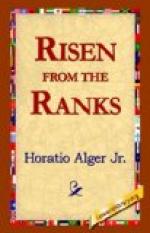“Thank you. From what you say, I am sorry Anderson has taken the fellow into the office.”
“You needn’t have much to say to him.”
“I shan’t trouble myself much about him. I didn’t like his looks when I first set eyes on him. I suppose old Mother Anderson will like him. She couldn’t abide my smoking, and he won’t trouble her that way.”
“So; he’s too mean to buy the cigars.”
“He said he couldn’t afford it.”
“That’s what it comes to. By the way, Clapp, when shall we take another ride?”
“I can get away nest Monday afternoon, at three.”
“All right. I’ll manage to get off at the same time. We’ll go to Whiston and take supper at the hotel. It does a fellow good to get off now and then. It won’t cost more than five dollars apiece altogether.”
“We’ll get the carriage charged. The fact is, I’m little low on funds.”
“So am I, but it won’t matter. Griffin will wait for his pay.”
While Harry’s character waa being so unfavorably discussed, he was taking a walk by himself, observing with interest the main features of his new home. He had been here before with Professor Henderson, but had been too much occupied at that time to get a very clear idea of Centreville, nor had it then the interest for him which it had acquired since. He went upon a hill overlooking the village, and obtained an excellent view from its summit. It was a pleasant, well-built village of perhaps three thousand inhabitants, with outlying farms and farm-houses. Along the principal streets the dwellings and stores were closely built, so as to make it seem quite city-like. It was the shire town of the county, and being the largest place in the neighborhood, country people for miles around traded at its stores. Farmers’ wives came to Centreville to make purchases, just as ladies living within a radius of thirty miles visit New York and Boston, for a similar purpose. Altogether, therefore, Centreville was quite a lively place, and a town of considerable local importance. The fact that it had a weekly paper of its own, contributed to bring it into notice. Nor was that all. Situated on a little hillock was a building with a belfry, which might have been taken for a church but for a play-ground near by, which indicated that it had a different character. It was in fact the Prescott Academy, so called from the name of its founder, who had endowed it with a fund of ten thousand dollars, besides erecting the building at his own expense on land bought for the purpose. This academy also had a local reputation, and its benefits were not confined to the children of Centreville. There were about twenty pupils from other towns who boarded with the Principal or elsewhere in the town, and made up the whole number of students in attendance—about eighty on an average.
Standing on the eminence referred to, Harry’s attention was drawn to the Academy, and he could not help forming the wish that he, too, might share in its advantages.




